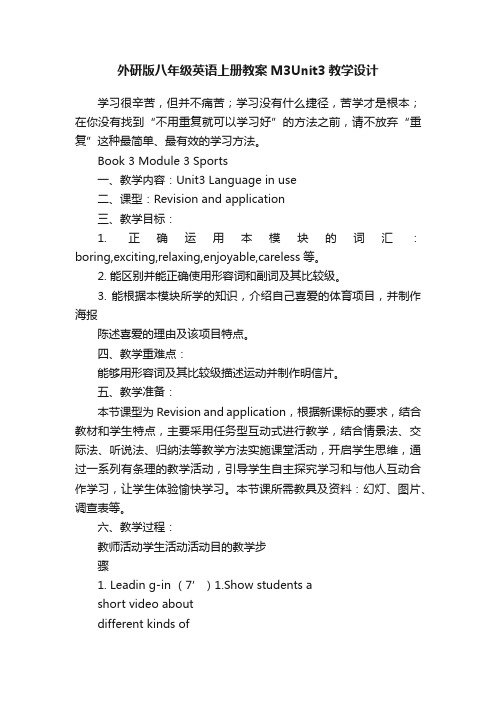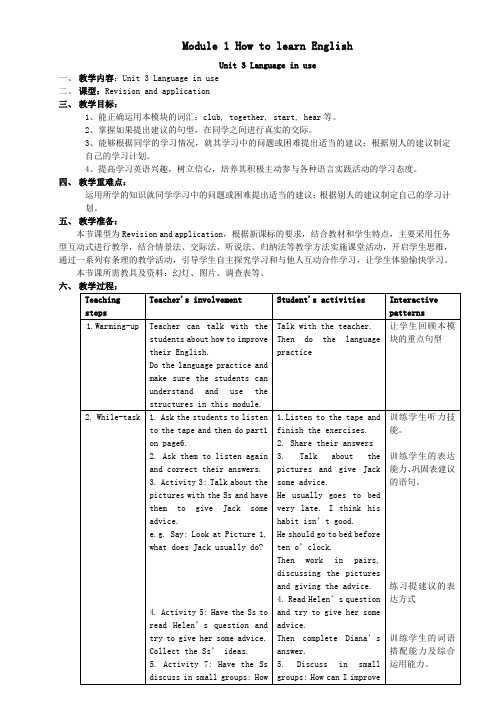八年级英语上外研版Module1 Unit 3 Language in use
外研版八年级英语上册课件M3-U3 Language in use

常用比较级一些不规则变化:
原级
比较级
good
better
bad
worse
little
less
many/much
more
far
farther/further
Are you familiar with these sentences? They are all from the texts we have learnt.
now.
loudly
6. They cheer useaornli_e_r______ (loud).
7. It gets dark ________ (early).
副词的基本用法
一般说来,副词主要用来修饰动词、形 容词和副词。例如:
She plays the piano badly. 她钢琴弹得很糟。
3. It’s safer than playing tennis. 4. That means we have a better chance of winning. 5. Nothing is more enjoyable than playing tennis. 6. They cheer us on loudly and we feel more confident to win the game. 7. Staying at home was easier than going to the stadium.
basketball tennis volleyball table tennis
bowling
football basketball tennis volleyball table tennis baseball bowling snooker
外研版八年级英语上册教案M3Unit3教学设计

外研版八年级英语上册教案M3Unit3教学设计学习很辛苦,但并不痛苦;学习没有什么捷径,苦学才是根本;在你没有找到“不用重复就可以学习好”的方法之前,请不放弃“重复”这种最简单、最有效的学习方法。
Book 3 Module 3 Sports一、教学内容:Unit3 Language in use二、课型:Revision and application三、教学目标:1. 正确运用本模块的词汇:boring,exciting,relaxing,enjoyable,careless等。
2. 能区别并能正确使用形容词和副词及其比较级。
3. 能根据本模块所学的知识,介绍自己喜爱的体育项目,并制作海报陈述喜爱的理由及该项目特点。
四、教学重难点:能够用形容词及其比较级描述运动并制作明信片。
五、教学准备:本节课型为Revision and application,根据新课标的要求,结合教材和学生特点,主要采用任务型互动式进行教学,结合情景法、交际法、听说法、归纳法等教学方法实施课堂活动,开启学生思维,通过一系列有条理的教学活动,引导学生自主探究学习和与他人互动合作学习,让学生体验愉快学习。
本节课所需教具及资料:幻灯、图片、调查表等。
六、教学过程:教师活动学生活动活动目的教学步骤1. Leadin g-in (7’)1.Show students ashort video aboutdifferent kinds ofball games.2.Have a free talkwith students.What’s yourfavourite sport?Why?1.The students watchthe video and learn thedifferent kinds of ballgames.2. Answer the questionslike this : My favouritesport is ...Because it’s...通过观看关于各种球类运动的视频,让学生从视觉上直观地了解各项球类运动的同时也活跃了课堂气氛,为进一步的学习做好铺垫。
外研版八年级英语上册Module1 Unit3课件

1 Listen and check(√ ) the expressions of advice you hear.
1 Why don’t we …? √
2 How about … ?
√
3 We should …
√
4 We can …
√
5 Let’s try to …
√
6 Can you …?
√
7 Remember to …
☺Try not to…
☺Remember to… ☺Remember not to…
☺Don’t forget to…
☺…had better do sth.☺… had better not do sth.
How to learn English well? ☺always speak English in class ☺write down the mistakes in the notebooks ☺check your vocabulary notebook every day ☺listen to the radio in English ☺read a newspaper in English ☺have a pen friend and write email messages to
He usually speaks Chinese in class.
He doesn’t use dictionary.
He usually write words on the notebook.
4 Give Jack some advice.
He should go to bed before nine o’clock.
2 Listen again and answer the questions.
外研版八年级英语上册课件Module 1 How to learn English Unit 3

7.你应该邀请你的新英国朋友到你的俱乐 部来.
you should invite your new English friends to your club !
8.Best wishes 最好的祝愿
Make phrases with the words.
ask answer check correct listen
speak English all the time. you (7)
___________invite your new English-speaking friends to
your club!
Best ,
Diana
Language points: 1.practise doing sth 练习做某事
look read translate write
to at down up for
a the your
sentence answer question
book meaning conversation grammar
word spelling
A test: complete the sentences with the words in the box
Helen No.6 Middle school New York U.S.A
Read the letter then choose the right words to finish the letter
Hello Helen,
You need to practice speaking more often (1)_______
我怎样练习讲英语?
How can I practise speaking English ? 2.be good /bad for 对…有利/ 好处 (有害)
八年级英语上册Module1HowtolearnEnglishUnit3Languageinuse教案(新版)外研版

Module 1 How to learn EnglishUnit 3 Language in use一、教学内容:Unit 3 Language in use二、课型:Revision and application三、教学目标:1、能正确运用本模块的词汇:club, together, start, hear等。
2、掌握如果提出建议的句型,在同学之间进行真实的交际。
3、能够根据同学的学习情况,就其学习中的问题或困难提出适当的建议;根据别人的建议制定自己的学习计划。
4、提高学习英语兴趣,树立信心,培养其积极主动参与各种语言实践活动的学习态度。
四、教学重难点:运用所学的知识就同学学习中的问题或困难提出适当的建议;根据别人的建议制定自己的学习计划。
五、教学准备:本节课型为Revision and application,根据新课标的要求,结合教材和学生特点,主要采用任务型互动式进行教学,结合情景法、交际法、听说法、归纳法等教学方法实施课堂活动,开启学生思维,通过一系列有条理的教学活动,引导学生自主探究学习和与他人互动合作学习,让学生体验愉快学习。
本节课所需教具及资料:幻灯、图片、调查表等。
六、教学过程:Blackboard design:达标训练题一、单项选择(7分)。
1. Speaking English loudly is good _____ improving my English.A. atB. forC. inD. of.2. ---Don 't forget __________ your homework ,John.---OK . I ' ll do it right now . .A. doingB. to doC. didD. do.3. --- Can I help you, sir ?--- I’d like to have 100 ______ . I want my students to draw pictures.A. piece of paper.B. pieces of papers.C. pieces of paperD. piece of papers4. We should ______our friends when we meet our friends on the street.A. say hello toB. say goodbye toC. saying hello to.D. speak hello to.5. He always practises __________ English so as to improve his oral English .----Of course . You 'd better get much listening practice.A. speakB. speakingC. to speak.D. speaks6. ---- Let’s discuss the play ,shall we ? Would you like ?---- Not now. I ________ to an interview.A. go.B. wentC. was goingD. am going.7. Your sweater looks smart. Where ________you ?A. do, get..B. did,get..C.will, get.D. have,got.二、阅读理解。
八年级英语上册 第一模块三个单元教案 外研版

Module 1 How to learn EnglishUnit 1 Try not to learn translate every word.Teacher Liu Baoxian Grade EightTime 45 minutesTeaching PlanTeaching Contents Unit 1 Try not to learn translate every word.Material & student analysis本模块以"How to learn English"为话题,以学习征求建议、提出建议的方法为主线,介绍了单词分类记忆、根据上下文判断词义、听力细节辨认、反向推理、略读等学习方法。
通过模块学习,除了能掌握上述英语学习方法之外,还可根据老师和同学的建议制定更适合自己的学习计划;同时,模块也综合复习了初一所学的一般现在时、现在进行时、一般将来时和一般过去时的用法。
Studying aims1、To get to know the key vocabulary and key structure.key vocabulary : translate,translation,correct,grammar, pronunciation, advice, else, each, send, orchestra, shy, forget, count key structure:You should always speak English in class.Why don’t you write down the correct spelling?It’s a good idea to check your vocabul ary notebook everyday.She can help me with my homework.2、To understand the dialogue 3 involving advice on learning English .3、To be able to describe what you should do when you study English and make a plan.Important & difficult points 1、提出建议的表达方式。
初中英语外研版八年级上册《Module1 How to learn English Unit 3

1 Listen and check( )√the expressions of advice you hear.
➢Why don’t we …? √ ➢How about …? √ ➢We should … √ ➢We can … √ ➢Let’s try to … √ ➢Can you …? √ ➢Remember to … √
语法专讲
How about doing sth.? = What about doing sth.?
What about / How about doing sth? 表示“做某事怎么样?”,其用法有: (1) 用来询问情 形或打听消息等,意为“……怎么样?/……如何?”。
(2) 用来提出要求,建议或征求对方意见,意为“(你认为)……怎么样? /……如何?”。
语法专讲
It’s a good idea to do …
It's a good idea to do sth. 意思是“做……是个好主张”。 =It is a great idea to do sth. 否定句:It isn't a good / great idea to do sth. It's a good idea for sb. to do sth.意思是 “对某人来说是个好主张”。
It's a good idea (to do) …
……怎么样?
努力(做)…… 努力不(做)…… 做……是个好主张
在英语中,我 们可以用多种 表达方式提出 我们的建议或 征求对方的意 见。大多语气 比较委婉,显 得客气而有礼 貌。
外研版八年级英语上册课件 Module Accidents Unit Language in use

B)用括号内所给单词的适当形式填空。 16.—Who ___t_h_r_e_w(throw) the ball into the room?
—I did,Mum. 17.The old man ____h__u_r(thurt) his leg when he got off the bus. 18.We use a mobile phone ____t_o_p_l_a(yplay) music. 19.The situation is much ____w_o_r(sbead) than I thought. 20.Where are you _____h_i_d_in(hgide) when I am looking for you?
Asking the driver to drive me fast to the station,I relaxed for a while, imagining what my friend looked like now.I was soon at the station and was sure that I would be able to __29__ the train.Unfortunately,I fell on the way and lost some time.To my complete __30__,when I reached the platform,I saw that the train had just left!It was the last train so I had to __31__ home.
( B)26.A.sign B.chance C.sense D.dream ( C)27.A.strange B.quiet C.late D.quiet ( B)28.A.Finally B.Luckily C.Strangely D.Suddenly ( C)29.A.stop B.see C.catch D.miss ( C)30.A.satisfaction B.hope C.surprise D.joy
- 1、下载文档前请自行甄别文档内容的完整性,平台不提供额外的编辑、内容补充、找答案等附加服务。
- 2、"仅部分预览"的文档,不可在线预览部分如存在完整性等问题,可反馈申请退款(可完整预览的文档不适用该条件!)。
- 3、如文档侵犯您的权益,请联系客服反馈,我们会尽快为您处理(人工客服工作时间:9:00-18:30)。
Unit 3 Language in use
提供建议的表达方式:
1. You should/shouldn’t do … 2. What about/How about doing…? 3. Why don’t you/Why not do…? 4. Let’s try (not) to do… 5. It’s a good idea to do… 6. Don’t forget/Remember to do...
5. — May I ______ your dictionary? — Sorry, I ______ it at home. A. borrow; forgot C. lend; forgot B. borrow; left D. lend; left
6. — I’m not interested in English. It’s difficult for me to
What/How ______ about correcting our mistakes ? ___________
2.I translated this article into English. (对画线部分提问) What _________ language did you _________ translate this article into ? ______
12. —Don’t forget ______ your dictionary here tomorrow. — OK. I won’t. A. taking C. bringing B. to take D. to bring
13. The boy went to the teachers’ office to _____ his teacher
Is there an English club in your town? If there is not,
(4)__________ why not start one with your friends?
(5)__________ How about playing a few games and listening to
_____ advice about improving his maths.
A. ask; for B. talk; about
C. speak; to
D. place; in
14. What he said _______ me ________ yesterday.
A. make; sad
C. made; sad
B. makes; sadly
D. made; sadly
15. — How about visiting the museum with me this afternoon? — _____. A. That’s right C. Good luck B. Good idea D. Best wishes
3.Remember to lock the door. (改为同义句) Don’t ______ forget to lock the door. ______
4.You should learn from Wei Hua. (改为否定句) shouldn’t ________ learn from Wei Hua. You _________
listening.
A. good; good C. well; good B. good; well D. well; well
8. My cousin is a ______ girl. She is afraid of speaking in front of many people. A. friendly C. shy B. polite D. helpful
learn it well. — Don’t worry. You will learn it well if you work harder, but it ___ time. A. costs C. pays B. spends D. takes
7. — How do you get on with your English? — I am ______ at grammar but I don’t do ____ in
how about
Hi, Diana,
should
try to
why don’t
why not
I like English very much. My reading is good, but my speaking is poor. How can Байду номын сангаас improve my speaking? Best, Helen
3. Both English and Chinese are important l________ anguages in the world. mprove 4. Thanks for telling me some good ways to i_______ my English. essages to 5. Most young people like to send text m_______ each other.
4. It’s a good idea to spell and pronounce new words aloud. 5. How about listening to the radio?
5. Read Helen’s question and complete Diana’s answer with the correct form of the word and expressions in the box. You need to use some of the expressions more than once.
wishes (wish) to your parents. 4. Please send my best ______
spelling (spell). 5. You should pay attention to your ________
IV. 句型转换 1.Let’s correct our mistakes. (改为同义句)
Ⅲ.用括号中所给单词的适当形式填空
1. I’m afraid that yourtranslation __________ (translate) is not
correct. speaking (speak) English 2. Every one should practise ________ every day. writing (write) is a 3. Lu Xun is a famous writer and ________ part of his life.
Homework
Write your own ideas about learning English well.
Where there is life , there is hope.
有生命就有希望。
A. not to worrying
C. not to worry
B. to not worry
D. to worry not
11. — What’s your plan for the coming weekend?
— ______ go to fly kites? A. Why not to C. Why don’t we B. Why don’t D. How about
9. — Your spoken English is really ____. — Thanks. It’s very nice of you to say so. A. deep C. basic B. excellent D. difficult
10. She tried ______, but she found it difficult.
some music? You can watch English films together, and (6)___ try to speak English all the time. You (7) _______ should invite your new English-speaking friends
to your club!
Best,
Diana
Practice
I. 单项选择 1. — _____ good advice he gave us! — Yes. He always has so many wonderful ideas. A. What B. What a C. How D. How a
Hello ,Helen,
You need to practise speaking more often.
Why don’t you look for some English-speaking (1)___________ people in your town? (2)__________ How about saying hello to them and asking them where they come from? Try to make friends with them and take them (3)_______ around your town.
2. My pen friend, Jack, often helps me _____my
English.
A. on B. in C. with D. about
3. Maria finds ______ difficult to translate these
sentences.
